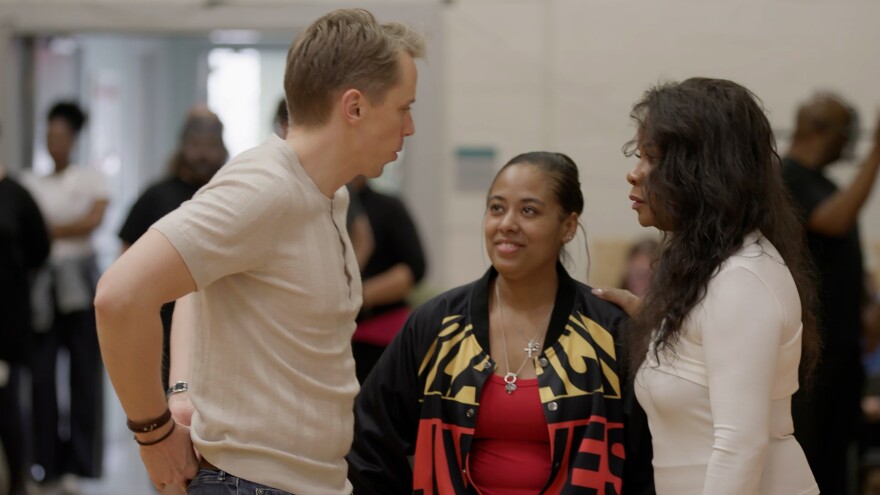Sixty-seven years ago, Richard and Mildred Loving committed a crime that Virginia Opera and Richmond Symphony will spotlight in a world premiere.
He was white and she was Black and Native American, and their interracial marriage was illegal in Virginia. Their eventual 1967 Supreme Court case ended race-based restrictions on marriage in the United States and is the basis for “Loving v. Virginia,” which opens at the Harrison Opera House in Norfolk on Friday.
Three years in the making, the opera is a collaboration between the opera and symphony and is the signature performance of the opera’s 50th anniversary season.
Old Dominion University graduate and Chesterfield County native Damien Geter is the composer and Jessica Murphy Moo is the librettist charged with setting the landmark case to music.
“It’s a love story and in the end, the Lovings win the day,” Murphy Moo said. “It feels good to know that things can turn out, can improve for the everyday person.”
On July 11, 1958, the Lovings were arrested at 2 a.m. in their Caroline County home for violating Virginia's Racial Integrity Act of 1924.
Murphy Moo, who lives in Portland, Oregon, traveled to Virginia to research the case. She connected with a local historian and visited the Caroline County courtroom where the Lovings were convicted.
“I wanted to soak it in,” said Murphy Moo, who drove around the rural community not only looking but listening to what she calls “the rolling hills and the quiet of this place. You want to look for those things when you tell a story through music.”
She sat inside the solitary cell where authorities held Mildred. While Richard was released on a bond, Mildred spent three nights in jail before being released into her father’s care.
“It felt very claustrophobic,” Murphy Moo said. “I imagined a summer day and it being very hot. I imagined feeling very alone and conveyed all those things to Damien.”

Murphy Moo pored through legal documents in an archive in Fredericksburg, read the original arrest warrant and court summons.
“It was really good to get close to that language,” she said. “You have to imagine what it felt like to receive something like that with language that is not easy to read. I tried to feel my way into their story.”
“Loving” is the Opera’s first commissioned piece in more than a decade. Virginia Opera artistic director Adam Turner has said in interviews that the company was looking to tell a Virginia story to celebrate its milestone. Turner liked the idea of having a Virginia native write the story and Geter, who grew up about an hour south of where the Lovings lived, was put on the list of candidates.
Geter earned an undergraduate degree in music education and a master’s in conducting from Indiana State. He embraces storytelling through opera, which he dubs “theater on steroids.”
“You don’t have to be a king or queen to effect change,” he said. “The story revolves around the fact that they were human beings who wanted to live their lives the way they wanted.”
Murphy Moo and Geter agree that the most challenging part of the opera was depicting the private conversations between the Lovings.
“I applaud Virginia Opera for taking the initiative to do something like this,” Geter said. “That doesn’t always happen with a company of this size.”
Mildred and Richard grew up as neighbors in Central Point outside of Richmond, a small community where people of different races lived together. The two began dating when Mildred was in high school and married when she was 18 and pregnant. They drove to Washington, D.C., where interracial marriage was legal, and got married on June 2, 1958. They lived in the city for a while but wanted to return to their home, where generations of their families had been raised. An anonymous tip led to their arrest.
The original ruling in the case waived jail time if they would leave the state for 25 years. The couple moved to Washington but did not like city living and sought help in 1963 from the American Civil Liberties Union. The Supreme Court decision in favor of the Lovings was unanimous and forced the 16 states that still had anti-miscegenation laws to change them.
The court decision is personal for Murphy Moo. She is white, and her husband, Sacha Moo, is Black. They have three children.
“It made my family possible,” she said. “Richard and Mildred Loving were standing up for themselves, but they were always standing up for my family and the rights we enjoy today. I have always felt immense gratitude to this couple.”
Richard Loving died in a car accident in 1975. Mildred died in 2008.
The Loving case continued to impact society. It set a precedent for the 2015 Obergefell v. Hodges case, which legalized same-sex marriage.
Director Denyce Graves Montgomery, a Grammy- and Emmy-winning opera singer, has said in interviews that she also thanks the Lovings for their courage. Her husband, Robert Montgomery, is white.
Soprano Flora Hawk makes her mainstage debut as Mildred, alongside Jonathan Michie, who makes his debut as Richard.
Ticketholders can join a 45-minute pre-show lecture.
“It’s a Virginia story and a Virginia composer, but it’s an American story, too,” Moo said. “This is American history. At the very center of it is this universal love story.”
“Loving v. Virginia” opens at 7:30 p.m. Friday at Harrison Opera House with a performance at 2:30 p.m. Sunday. Additional dates for the opera include May 3 and 4 in Fairfax and May 9-11 in Richmond.
Visit vaopera.org for tickets and information.


